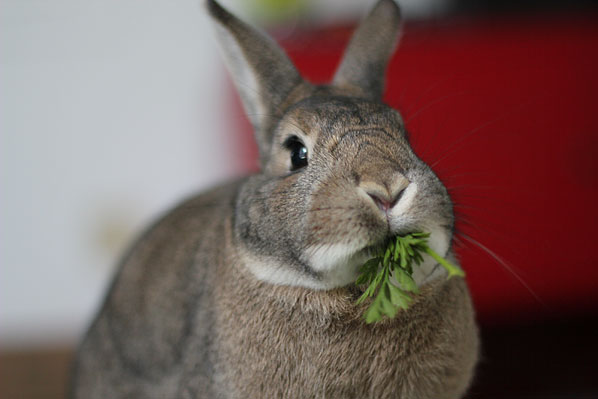7 Ways Rabbits are Eco-Friendly Pets
There are many benefits to owning a pet rabbit: they’re utterly adorable, they’re funny, they’re quiet, they’re clean… I could go on and on. But one thing many people may not realize is that rabbits are ecologically-friendly pets. Here are seven ways that pet rabbits help contribute to a healthy environment.
1. You Can Grow Their Food Yourself
You can grow a lot of their food yourself in a backyard garden. Rabbits eat an assortment of greens such as romaine and other dark leaf lettuce, collard greens, kale, parsley, and cilantro, which you can grow in your own home garden vegetable patch. They also love dandelion greens and flowers, so you can kill two birds with one stone and feed your bunnies your unwanted weeds. Growing your rabbit’s food yourself helps the environment by cutting down on energy consumption and waste production caused by manufacturing, packaging, storing and shipping commercial food. (See our article Bunny Gardening for Beginners for more information on starting a garden.)
2. You Can Compost Rabbit Droppings
You can use both their recycled paper litter and their droppings in a compost pile, which will then fertilize your garden. In fact, rabbit droppings contain a large amount of nitrogen and phosphorus which is essential for flower and fruit production. [1] This is not true for carnivorous pets like cats and dogs. Their waste products are not recommended for compost heaps. Furthermore, many kinds of clay-based cat litter come from strip mining and are non-degradable. [2]
 Learn More
Learn More3. You Can Buy Hay Locally from a Farm
Even if you’re not a gardener, you can purchase their main diet staple, grass hay, along with other vegetables, from local farmers, again diminishing carbon emissions, chemicals, and other waste products that result from shipping commercial food.
4. They Will Shred Your Sensitive Documents
Rabbits are effective paper shredders. No need to waste money and electricity on an electric shredder- rabbits’ teeth grow continuously, so they need objects to chew on a regular basis. They will happily destroy your sensitive documents.
Read also: Feeding management for rabbits
5. Your Cardboard Recyclables = Bunny Toys
Rabbits’ favorite toys consist of items you would normally throw away or recycle. They love playing with toilet paper rolls, outdated phone books, old towels, cardboard boxes, etc. Again, this reduces waste associated with manufacturing, packaging, storing, shipping and advertising commercial pet toys. But, if you really must buy a toy for your bunny, you can be sure that he/she will also love the cardboard packaging (perhaps even more than the toy itself).
6. No Trips to the Dog Park
Rabbits are content to run around in your house or apartment, so you don’t have to make regular trips to the dog park. This reduces gas consumption and carbon emissions. In addition, because house rabbits stay inside and use their eco-friendly litter boxes, you don’t have to worry about proper poop disposal like you do with dogs. Not only are many dog poop bags non-recyclable and non-degradable, but dog fecal bacteria currently pollutes our storm drain systems causing disease to humans and wildlife.
Read also: Rabbit Production guide
7. They are Clean Animals
House rabbits are very clean animals and, in general, they manage to carry on relatively disease-free lives. This means a reduction of harmful chemicals and drugs associated with pet shampoos, flea and tick treatments, and other medications. These pollutants cause an array of problems such as drug-resistant bacteria, contamination of waterways, and health concerns for aquatic animals.
So there you have it: seven ways rabbits are environmentally-friendly pets. Just another benefit to owning a pet bunny!
For more information and updates join our WhatsApp group HERE
Follow us on Twitter Here











